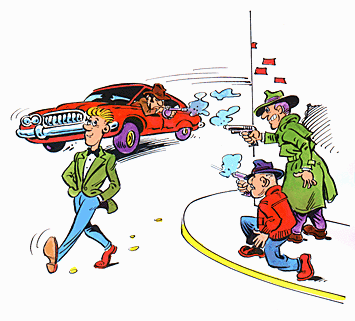phobo-, phob-, -phobia, -phobias, -phobe, -phobiac, -phobist, -phobic, -phobism, -phobous
(Greek: fear, extreme fear of; morbid, excessive, irrational fear, or terror of something or someone; however, sometimes this Greek element also means a strong dislike, dread, or hatred for something or someone)
For more details about the various phobias, visit this Phobias Introduction page to see Phobia Variations Defined and Explained.
There are only two forces that unite men: fear and self-interest.
An irrational fear or an unspecific terror of everything: Suffering from panophobia, Nancy was in a state of general unexplained and groundless anxiety after her friend left to go back home, although she had no reason to be so restless, worried, and troubled.
Lacking fear; an abnormal fearlessness: Maggie, the little toddler, seemingly had pantaphobia because she was totally unafraid and undaunted when she was crawling on all fours and discovering the rest of the house and all the new, unfamiliar, and sometimes dangerous things it had!


Having no fear in certain circumstances could be fatal!
Pantaphobia can be a dangerous condition in which there is absolutely no fear of anything; broken down as panto- (all, every) and a- (no, not) + phobia (fear). It can lead to a careless lifestyle resulting in a shorter span of existence.
The antonyms (opposites) of pantaphobia, or terms that indicate an excessive or abnormal fear of everything, include such words as: panphobia, panophobia, and pantophobia.
A strong dislike of the pope or the papacy: Jane's parents never understood why she had papaphobia because the rest of the family had no problems with going to their neighbourhood church and were on friendly terms with the clergy.
An uncontrolled dread of graves: After reading some gruesome tales about vampires and cemeteries, Charles developed paphophobia and avoided reading such stories and stayed away from tombs, vaults, crypts and mausoleums!
The excessive dread of paper: Why Doug had papyrophobia was very strange, but perhaps he always thought paper meant that he had to write another essay or text, or even worse, take an exam!
A fear of the neglect or omission of some duty, obligation, or responsibility: Jack, suffering from paraliphobia, was certain that some kind of disaster would arise because he had forgotten to do his required homework, and either his teacher or his parents would punish him for neglecting to complete it!
A moderate fear, especially one which a person can control with reasoning: Mrs. Fisk was lucky that she only had a paraphobia instead of an extreme one, and after thinking about her problem and using logical deduction she overcame her difficulty with the dog barking next door!
parasitophobia (s) (noun)
An irrational dread of parasites: The middle-aged Mrs. Thompson went to her family doctor yet again describing the symptoms of an infestation being under her skin or inside her body, but after being thoroughly examined, the doctor didn't find any such disorder and diagnosed her as having parasitophobia!
An abnormal fear of young girls or virgins: Rick suffered from parthenophobia and decided not to accept a teaching job in the one room school house for girls because he had had a very bad experience years back with the gal next door to his parent's home.
1. A fear regarding the Fathers of the early Church: In the story Jim was reading he came across a very young character who developed patrophobia and avoided the priests by running away and hiding.
2. An abnormal dread of one's father: Sometimes Grace's dad came home late and, being drunk, he behaved quite badly towards her mother and the other children, and from then on she had patrophobia and ignored him and steered clear of him whenever possible!
2. An abnormal dread of one's father: Sometimes Grace's dad came home late and, being drunk, he behaved quite badly towards her mother and the other children, and from then on she had patrophobia and ignored him and steered clear of him whenever possible!
A horror of getting any kind of a disease: Thomas decided to try to keep as many viruses and germs out of his home as possible, and therefore he washed his hands quite often every day, did the laundry, vacuumed, and mopped the floors every day, and his friends thought he had pathophobia for sure!
An excessive fear of heredity: Many people who are overwrought with patroiophobia are quite frightened that their children will inherit physical deformities or mental disorders that have been present in their family in the past.
peccatiphobia (pek uh ti FOH bi uh), peccatophobia (pek uh tuh FOH bi uh) (s) (noun); peccatiphobias, peccatophobias (pl)
An very strong fear of being depraved or of doing immoral acts: Even the most righteous people can have peccatiphobia because of the many temptations which are difficult to avoid.
An abnormal terror or fear of infants, dolls, or young children: Some adults try to avoid babies or youth thinking that they are messy, are loud and noisy, or have dirty hands, and the grown-ups, feeling quite nervous and uneasy, are seemingly afflicted with pediophobia!
An abnormal fear of lice or of being infested with lice: Jane had a feeling of having such little bloodsucking insect parasites on her scalp, but her doctor said she must have pediculophobia because the only thing she had was very dry skin which caused her to feel that way!


